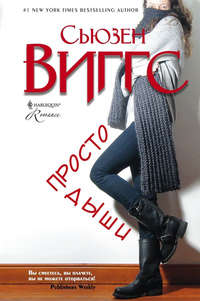
Полная версия
Snowfall at Willow Lake
“In Mayberry.”
“Avalon, but that’s the idea.”
“And do … what, exactly? You need to reconnect with your kids. I get that. Is that a full-time occupation?”
She zipped her jewelry into a side pocket of her case. The small pouch of tasteful baubles made her remember the conversation with Brooks Fordham that night about her refusal to own anything produced by exploitation of labor. “I don’t know,” she said to Tariq. “I’ve never done it before.”
“And why would you even want this?” he asked her without a hint of irony.
“Because I’ve never had it,” she replied. “Because being part of a community has never happened to me and I think it’s about time. Because underneath this legal robot you see, I have a heart.”
She and Tariq went to the tiny nook of the main room, which served as her study. This, too, was devoid of personal items except her laptop and a corkboard to which she’d pinned a few items. “My rogues’ gallery,” she told Tariq. “And it’s all yours now.”
The faces of the warlords had been her motivation for the past two years. The plan was to prosecute each one in turn at the International Criminal Court. The people on her corkboard represented the very worst of humankind—men who practiced child conscription, sexual torture, slavery. She took down each picture in turn, making a small ceremony of handing them to Tariq.
“That’s it, then,” she said, slipping the laptop into its case. “You’re going to do great things.”
“And you’re walking away from doing great things.”
She shook her head. “I walked away from my marriage and family. I can’t ever go back to the marriage, but my family still needs me.” She thought they did, anyway. She hoped. They had certainly taught themselves to get along without her. Maybe the truth was that she needed them.
“I’ve never seen you run away from anything,” Tariq said. “This isn’t like you.”
“Oh, it’s exactly like me. When it comes to my professional life, to cases involving genocidal murderers, you’re absolutely right. I’ve been like a dog with a bone since I was in high school. But in my personal life, I’ve done exactly the opposite. Here’s the thing. You can’t run from yourself. It only took twenty years and a few hours with a team of terrorists for me to figure that out.”
She took a deep breath, looked around the apartment with her things packed in boxes. The place was as impersonal and anonymous as a hotel room.
She was off, then, to make things right with her family. It was insane, going to a place where the Bellamy family had been entrenched for generations, where her ex-husband was living happily ever after with his new wife. Yet this was the place her children lived, and she intended to be their full-time mother. She hoped with all her heart that it wasn’t too late.
Part Five

February
A cheer for the snow—the drifting snow;
Smoother and purer than Beauty’s brow;
The creature of thought scarce likes to tread
On the delicate carpet so richly spread.
—Eliza Cook, English poet
Morning Muffins from the Sky River Bakery
1 1/2 cups flour
3/4 cup ground flax seed
3/4 cup oat bran
1 1/2 cups brown sugar
2 teaspoons baking soda
1 teaspoon baking powder
1 teaspoon salt
1 tablespoon ground cinnamon
3/4 cup milk
2 eggs, beaten
1 teaspoon vanilla extract
1/2 cup vegetable oil
2 cups peeled and shredded carrots
2 apples, peeled and shredded
1/2 cup raisins or currants
1 cup chopped walnuts
Preheat oven to 350°F. Mix flour, flax seed, bran, brown sugar, baking soda, baking powder, salt and cinnamon. In a separate bowl, combine the milk, eggs, vanilla and oil. Add to the dry ingredients. Fold in the carrots, apples, raisins and nuts. Fill prepared muffin cups two-thirds full with batter.
Bake for fifteen to twenty minutes.
Eight

Sophie woke up hugging a warm teddy bear in a strange bed. Hovering in the zone between full alert and dreams, she lay very still, waiting for the customary nightmares to fade. She’d learned that they would, eventually. But she wondered if she would ever stop seeing the faces of the dead or feeling the desperation and panic that had seized her in the moments before the accident.
Yet this morning, the memories seemed curiously distant. Simply lying adrift felt so good that she held still, hugged the teddy bear closer and kept her eyes shut, prolonging a completely unjustified sensation of well-being.
When it came to jet lag, she was a champ at dealing with it. Besides, with her frequent trips back to the States, she had enough miles for an upgrade every time. She’d schooled herself to sleep with the self-discipline of a yoga master. But it was never a restful sleep. Therefore, feeling warm, comfortable and rested was simply wrong.
Finally, like drips of water through a slow leak, little awarenesses pried her awake.
Landing at JFK, making the drive upstate through ever-thickening snowfall. A deer leaping out of nowhere, the swinging glare of her headlights as she swerved to avoid hitting it. Then came the terrible thud and a bone-jarring jolt as she came to rest in the ditch. And then … someone had arrived. She remembered looking up and seeing him outside her window, a man …
Encountering a large, strange man, when she was alone, stuck in a snowbank in the middle of nowhere, should have set off alarm bells. However, she experienced nothing of the sort. After his imposing height and big shoulders, the first things she’d noticed about him were his kindly eyes and boyish grin. She and Dr. Maarten had talked about this in her therapy sessions, the gut sense of danger that she must learn to distinguish normal caution from trauma-induced anxiety. When she’d looked at the stranger, standing in the snow, the only thing she felt in her gut was a wave of sturdy trust.
He’d rescued her. He had somehow healed the fallen deer. He’d sewn up her wound. He was heart-thumpingly, shatteringly attractive in an unexpected way. Big and broad, like a working-class hero or farmer, a far cry from the sort of men she knew.
And now, having succumbed to the multiple fatigues of jet lag, exhaustion and injury, she lay in a comfy bed in a guest room of his house.
The teddy bear yawned and stretched.
Sophie gave a gasp and scrambled out of bed, clutching the blankets to her chest. There was a heated tug of pain in her knee, but she ignored it and stared at the small, furry thing on the bed.
“Oh, my God,” she whispered on a breath of panic. “Oh, my God.”
She was ordinarily more articulate than this, but all she could do was stare. Then she opened the drapes to reveal the cold white glare of the winter morning, and stated the obvious. “You’re a puppy. I slept with a puppy.”
It stared at her, alert and seemingly unperturbed by her erratic behavior. Its tiny spike of a tail quivered, and it let out a series of yips, sounding like a windup toy at FAO Schwarz.
Sophie didn’t do puppies. She’d never had a dog, growing up, and raising her children in Manhattan had made it completely impractical.
The pup went to the edge of the bed and gazed fearfully at the floor, then worriedly at Sophie.
“Just jump,” she said. “It’s not that far.”
It skittered back and forth, gave a nervous whimper.
“You managed to climb up, so you should be able to find a way down.”
The dog responded with a pitiful whine.
“Oh,” Sophie said, feeling a curious flood of sentiment. She reached out with her hand, and the puppy sniffed it delicately, gave her a lick of approval with its tiny pink tongue, then yipped at her. Awkwardly, she scooped the little thing up, holding it at arm’s length. The puppy squirmed and she nearly dropped it, so she quickly gathered it against her chest. Its coat was a yellow fluff of down—half dog, half Easter chick. It had a milky-new smell, and it wriggled somewhat frantically, trying to lick her face. Then, like a newborn, it snuggled against her shoulder.
“So this is a puppy,” she whispered, brushing her lips over its velveteen ear. “How did I live so long without a puppy?”
Like all kids, Max and Daisy had of course begged her for a dog. Their friends all had dogs, they pointed out with age-old kid logic. She fired back that their friends all had dog walkers or stay-at-home moms. She explained that it would be cruel to the dog. Left alone during the day, its outside would consist of controlled visits to the postage-stamp-size park where you were required to pick up its poop. Did either Max or Daisy feel like walking around behind a dog in the rain, picking up its poop? That effectively shut down the arguments.
“Max and Daisy,” she said aloud, setting down the puppy and snatching up her phone. Her thumb was hovering over the keypad when she noticed the time—6:47 a.m. Too early to call. Setting aside the phone, she caught a glimpse of herself in the mirror on the back of the door.
“Lovely,” she muttered. “I’m channeling Blanche Dubois.” It was a combination of her negligee and the fact that she had just rolled out of bed. After a night of hard sleep, even the Dior negligee looked cheap. And skimpy. Sophie’s salon-pampered hair was rumpled, her eyes still blurred with sleep. She had long favored skimpy nightgowns, a secret, decadent indulgence.
It wasn’t as if she bought them to impress a man. She and Greg had been in college when they met. College boys tended to like anything with boobs, so she didn’t need lingerie—a team T-shirt would do. She loved the luxurious feel of lace and silks, though. The lingerie was the last bastion of femininity and youth. Giving in to flannel granny gowns would be an admission of defeat.
She refused to become a flannel granny.
But good heavens. It was cold this morning. Shivering, she looked around the room. This was an older house with tall ceilings and braided rugs on wood floors. She was in an old-fashioned bedroom with fading quilts on the bed, a marble-topped washstand, chintz curtains on the windows. Everything here had a sense of permanence, yet there was an ineffable air of neglect, as well. The faint cedary smell of the bed linens suggested that this room didn’t get much use.
She had a luxurious cashmere robe, but it was in her other bag, still in the trunk of the rental car. So were her slippers. She examined her boots, finding one of them stained with dried blood. She wiped it as best she could with some damp tissues. Then she zipped on her high-heeled boots, which made a bold statement combined with her skimpy nightgown. Just give me a whip and a chain, she thought, and I’ll be the dominatrix you’ve always dreamed of. She tugged a soft, hand-crocheted throw from a rocking chair and drew it around her.
The puppy let out a yip and peed on the floor.
“Oh, for heaven’s sake.” Sophie regarded the dark wetness spreading on the braided throw rug in the doorway. Now she remembered why she didn’t do puppies. She loosely rolled up the throw rug. Holding it gingerly, she made her way downstairs, passing faded cabbage-rose wallpaper and a leaded-glass window at the landing. The puppy loyally followed, jumping from step to step down the stairs and nearly crash-landing at the bottom. It seemed completely unhurt, though, and stayed focused on Sophie, as though imprinted like a duck. She couldn’t help smiling, despite the rug. The accident was her fault, really. The dog was a baby. Its bladder was tiny. She should have taken it out immediately to do its business.
Конец ознакомительного фрагмента.
Текст предоставлен ООО «ЛитРес».
Прочитайте эту книгу целиком, купив полную легальную версию на ЛитРес.
Безопасно оплатить книгу можно банковской картой Visa, MasterCard, Maestro, со счета мобильного телефона, с платежного терминала, в салоне МТС или Связной, через PayPal, WebMoney, Яндекс.Деньги, QIWI Кошелек, бонусными картами или другим удобным Вам способом.








